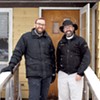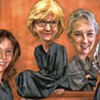click to enlarge 
Even after they obtained a
conviction in January against a Bosnian refugee accused of lying about his involvement in war crimes, prosecutors from the U.S. Attorney's Office in Burlington remained tight-lipped about the origin of their case.
Federal prosecutors would say only that they had learned of Edin Sakoc, who settled in Vermont in 2001 after he was granted refugee status, while investigating other offenses during the Bosnian War.
The
New York Times on Sunday provided some vital context to the case. The
Times reported
that the Department of Justice has initiated a wave of cases across the country against Bosnian immigrants who may have lied about their involvement in the early 1990s Balkans conflict.
Officials have identified 300 Bosnians living in the United States who participated in war crimes or ethnic cleansing during the conflict, and the suspect list may eventually grow to 600 people, the
Times reported. "The effort to identify suspects included an appeal broadcast to Bosnians around the world in February, urging witnesses to come forward with any information about war crimes," the
Times reported
.
Kathleen O’Connor, a human rights prosecutor at the Justice Department, said in a message translated into Bosnian on the Voice of America network that "justice can be served in the United States despite the fact that many years have gone by and that the conduct occurred overseas, far away."
The
Times highlighted cases against a soccer coach in Virginia, a metal worker in Ohio and four hotel casino workers in Las Vegas. The story also mentioned Sakoc, who is facing deportation and possible prison time after he was convicted by a Vermont jury. Prosecutors accused Sakoc of concealing his role in a rape and two murders of Serbian women when applying for refugee status and citizenship. Jurors deliberated for 12 hours before finding Sakoc guilty of unlawful procurement of naturalization.
"Many offenders were able to get away," the
Times reported.
"When more than 120,000 Bosnian refugees began applying for American visas in the mid-1990s, they were required to disclose military service or other allegiances that might have suggested involvement in war crimes. But the system relied largely on the honesty of the applicants, and there was little effort to verify their statements."
Sakoc is expected to be sentenced later this year. A hearing date has not been set. He was meanwhile released to live with friends in Essex Junction.



















































